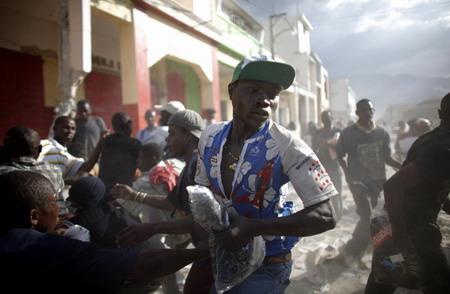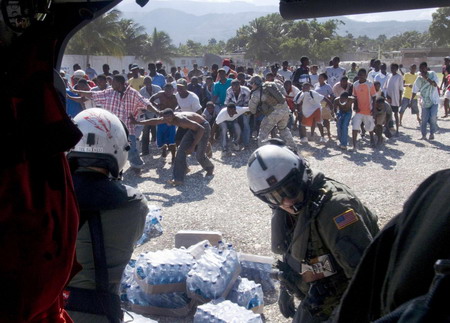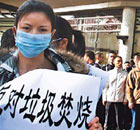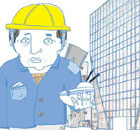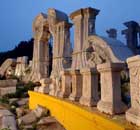Asia-Pacific
Hunger and hope, thirst and frenzy grip Haiti
(Agencies)
Updated: 2010-01-17 10:45
 |
Large Medium Small |
|
|
PORT-AU-PRINCE, Haiti: Precious water, food and early glimmers of hope began reaching parched and hungry earthquake survivors Saturday on the streets of this shattered city, where despair at times turned into a frenzy among the ruins.
"People are so desperate for food that they are going crazy," said accountant Henry Ounche, in a crowd of hundreds who fought one another as US military helicopters clattered overhead carrying aid.
When other Navy choppers dropped rations and Gatorade into a soccer stadium thronged with refugees, 200 youths began brawling, throwing stones, to get at the supplies.
Still, here and there, the murmur of buried victims spurred rescue crews on, even as aftershocks threatened to finish off crumbling buildings.
"No one's alive in there," a woman sobbed outside the wrecked Montana Hotel. But hope wouldn't die. "We can hear a survivor," search crew chief Alexander Luque of Namibia later reported. His men dug on. Elsewhere, an American team pulled a woman alive from a collapsed university building where she had been trapped for 97 hours.
Nobody knew how many were dead. Haiti's government alone has already recovered 20,000 bodies -- not counting those recovered by independent agencies or relatives themselves, Prime Minister Jean-Max Bellerive told The Associated Press.
In a fresh estimate, the Pan American Health Organization said 50,000 to 100,000 people perished in the quake. Bellerive said 100,000 would "seem to be the minimum." Truckloads of corpses were being trundled to mass graves.
A U.N. humanitarian spokeswoman declared the quake the worst disaster the international organization has ever faced, since so much government and U.N. capacity in the country was demolished. In that way, Elisabeth Byrs said in Geneva, it's worse than the cataclysmic Asian tsunami of 2004: "Everything is damaged."
Also Saturday, Secretary of State Hillary Rodham Clinton flew to Port-au-Prince to pledge more American assistance and said the US would be "as responsive as we need to be." President Obama met with former Presidents George W. Bush and Bill Clinton and urged Americans to donate to Haiti relief efforts.
As the day wore on, search teams recovered the body of Tunisian diplomat Hedi Annabi, the United Nations chief of mission in Haiti, and other top U.N. officials who were killed when their headquarters collapsed.
Despite many obstacles, the pace of aid delivery was picking up.
The Haitian government had established 14 distribution points for food and other supplies, and US Army helicopters were reconnoitering for more. With eight city hospitals destroyed or damaged, aid groups opened five emergency health centers. Vital gear, such as water-purification units, was arriving from abroad.
Thousands lined up in the Cite Soleil slum as U.N. World Food Program workers distributed high-energy biscuits there for the first time. As the hot sun set, the crew was down to just a few dozen boxes left from six truckloads. Perhaps 10,000 people were still waiting patiently, futilely, in line.
Seven months' pregnant, and with two children, 29-year-old Florence Louis clutched her four packets. "It is enough, because I didn't have anything at all," she said.
On a hillside golf course, perhaps 50,000 people were sleeping in a makeshift tent city overlooking the stricken capital. Paratroopers of the US 82nd Airborne Division flew there Saturday to set up a base for handing out water and food.
After the initial frenzy among the waiting crowd, when helicopters could only hover and toss out their cargo, a second flight landed and soldiers passed out some 2,000 military-issue ready-to-eat meals to an orderly line of Haitians.
|
|
